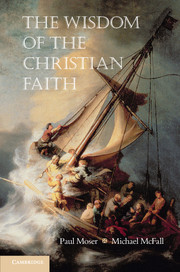Book contents
- Frontmatter
- Contents
- Contributors
- Introduction:Philosophy and Cruciform Wisdom
- Part One Wisdom, Faith, and Reason
- Part Two Wisdom, Love, and Evil
- Part Three Wisdom, Contemplation, and Action
- 9 Meaningful Life
- 10 Beauty and Aesthetics in Theology: The Art and Beauty of Wisdom
- 11 Education for Political Autonomy
- 12 The Wisdom of Hope in a Despairing World
- Index
- References
12 - The Wisdom of Hope in a Despairing World
Published online by Cambridge University Press: 05 December 2012
- Frontmatter
- Contents
- Contributors
- Introduction:Philosophy and Cruciform Wisdom
- Part One Wisdom, Faith, and Reason
- Part Two Wisdom, Love, and Evil
- Part Three Wisdom, Contemplation, and Action
- 9 Meaningful Life
- 10 Beauty and Aesthetics in Theology: The Art and Beauty of Wisdom
- 11 Education for Political Autonomy
- 12 The Wisdom of Hope in a Despairing World
- Index
- References
Summary
Hope is one of the most distinctively human and pervasive of all emotions and attitudes. As Samuel Johnson aptly remarked, “The natural flights of the human mind are not from pleasure to pleasure, but from hope to hope.” Its pervasive presence, moreover, is an indication of the positive value we place on hope. A life without hope is more than pitiful; indeed, it is worse than desperate. To be without hope is to have no reason whatever to look forward with anticipation, it is to be bereft of any prospect of joy and satisfaction. The worst possible state for a human being is captured in Dante's most famous line from his inscription over the gates of hell: “Abandon every hope, who enter here.”
Hope is hardly an unmixed good, however. The very fact that hope is such a pervasive dimension of human experience is a profoundly telling indicator that all is not well. In brief, hope exposes the fact that our inveterate desire to be fully happy is far from being satisfied. Our desire for happiness and our relentless pursuit of it is as endemic to human experience as breathing, and no less optional for a living rational being, yet the quest for happiness meets at best with sporadic and partial success, despite the ever present efforts to achieve it throughout human history, and the staggering variety of ways in which it has been sought.
- Type
- Chapter
- Information
- The Wisdom of the Christian Faith , pp. 244 - 264Publisher: Cambridge University PressPrint publication year: 2012
References
- 2
- Cited by



